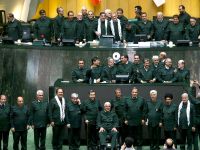By Munir K. Nasser
Washington, DC
A former US Assistant Secretary of State said that the Palestinians lost a chance to reach an agreement with Israel at Camp David because their delegation was not as well prepared to deal with all the new possibilities as the Israeli and the American delegations were.
Robert Pelletreau, who has served as Assistant Secretary of State for Near East Affairs and as US ambassador to Egypt, Tunisia, and Bahrain, said the Palestinians froze themselves into an inflexible position because they lacked “archival backup”.
Pelletreau told Albawaba.com in an interview that Egypt is playing a very positive role by helping the Palestinians understand fully all the implications of the proposals that were discussed at Camp David.
Pelletreau said a solution on Jerusalem is going to require compromise because the absolute positions of each side don’t match. He stressed that both sides have to emphasize some different aspects such as sovereignty over the holy places and over the purely Arab parts of Jerusalem, rather than referring to east Jerusalem as a single comprehensive block.
The following are excerpts of the interview:
Q- It seems that the US and other Western countries blame President Arafat for the failure of the Camp David peace summit. Do you share that view?
A- I have a little different view of it. The issue of Jerusalem was discussed at Camp David in much more detail that it has ever been discussed in any kind of bilateral discussions. And a lot of new proposals and new hypothetical possibilities were put on the table, many of them by the United States, and the Palestinian delegation was not as well prepared to deal with all these new possibilities as the Israeli and the American delegations were.
Q- Why were they not prepared?
A- There is a bit of it in the nature of their ‘negotiating culture’ in a way. They don’t have a lot of what I call ‘archival backup’, and they do a lot of their reaching a position by back and forth discussion to gradually reach consensus. This is Arafat’s style. I think what happened at Camp David was they weren’t sure where all these hypothetical questions might lead. And they sort of froze themselves into an inflexible position.
Q- Do you think Arafat was reluctant to take a bold step, or was he aware of the Arab world position on the issues?
A- I think he was aware of the Arab world position, but I think he never intended what the Palestinians said, and did at Camp David, to be the absolute last word. We have seen since the Camp David discussions that the Palestinians and the Egyptians have had some very detailed discussions and sessions. And I think the Egyptians have been working with the Palestinians to analyze some of the stuff they heard at Camp David so they could understand all the implications.
Q- But some American officials are blaming Egypt for urging Arafat to take a hard position on Jerusalem. Do you read it that way?
A- I honestly believe that is a misunderstanding of what Egypt is doing. In my view, Egypt is actually helping the Palestinians to understand fully all the implications of the proposals on the table and is working with the them to come up with proposals that are satisfactory to them. Actually I have seen this work before in the early stages of the [Oslo Agreement], or what I call the Gaza-Jericho Agreement. There were two Egyptian lawyers that were seconded to the Palestinian delegation as technical advisors who helped in the preparations. I think a similar thing is going on. You have seen the amount of visiting back and forth by Arafat to Egypt, which is playing a central role here. I think it is a positive thing.
Q- King Abdullah of Jordan visited Israel this week. What role is he playing in the peace process?
A- That also is very positive. That will help show the Israeli people that Arab leaders are ready to live with a just and fair settlement.
Q- Do you think the King is playing the role of a mediator between the Palestinians and Israel?
A- I don’t think he is a mediator as such. I think he is an influential voice in the Arab world.
Q- Some press reports said there is disagreement between Palestinians and Jordanians over Jordan’s role over the holy sites in Jerusalem. Do you think that will complicate things between them?
A- I think there has been some evolution since the Jordanian-Israeli agreement was reached. King Hussein of course felt a special responsibility. I think the Jordanian position has shifted somewhat. I also think the Jordanians feel a great deal of responsibility for Palestinians who are now Jordanian citizens and they feel a responsibility to speak for those citizens. But it seems to me that the primary negotiators have to be the Palestinians.
Q- Many analysts say that Barak did the unthinkable by compromising on Jerusalem and accepting the concept of shared sovereignty in the city. Do you see that as a positive development?
A- I do see that as a positive development. I think that Prime Minister Barak might have been somewhat ahead of the center of Israeli opinion. One of the problems here is the whole symbolic nature of Jerusalem and each side has been conditioned for generations to think of Jerusalem in inflexible and absolute terms. And here comes Barak really putting on the table new proposals for shared sovereignty, and I think this shook up some Israeli people to begin with. All of this is going to take a little time to sink in.
Q- So eventually you expect a breakthrough in the thinking of the Israeli public opinion on Jerusalem?
A- Yes. We know better after Camp David that a solution on Jerusalem is going to require compromise. If you take the absolute position of each side, they don’t match. There is not a way that you can fit the puzzle together. So that’s going to require compromise, which is going to require some conditioning of public opinion, and that is what Barak has started to do in Israel.
Q- Do you expect the Palestinians to cross their red lines on Jerusalem?
A- I think they are going to have to emphasize some different aspects from what they have been emphasizing, such as the importance of having sovereign jurisdiction over the Palestinian people of Jerusalem. They should also emphasize the sovereignty over the holy places and over the purely Arab parts of Jerusalem, rather than referring to east Jerusalem as single comprehensive block. And I think if you do it in the right way, with aspects of shared sovereignty and looking at aspects of functional sovereignty, rather than pure territorial sovereignty, you can keep an overall unified city. There are such concepts such as you would have a Palestinian mayor of Jerusalem just as you would have an Israeli mayor.
Q- As a diplomat who dealt with these issues before, do you think they are heading into this direction?
A- I think they are heading in this direction, but I have a question. How quickly can these sorts of new compromise concepts be absorbed and accepted by the people?
Q- Do you think Arafat will reconsider the declaration of a state on September 13?
A- I think he is on a course to reconsider for very practical reasons. Palestinians know that a negotiated solution is much better than a unilateral solution, which is going to create a confrontation. We have seen statements by Israeli leaders over the past year that we never seen before. But honestly, having been involved in these negotiations in a number of years, I think deadlines are unrealistic.
Q- President Clinton’s remarks on Jerusalem have complicated the situation somewhat. What role do you see him playing as his term in office comes to an end?
A- President Clinton has a deadline that can’t be slipped. September 13 can be adjusted, but the end of the Clinton Administration can’t. I think Clinton sees very clearly that what he is being able to do in the Middle East is one of the things that will stand out in his presidency. And he would like to add to that as much as possible. He is now so deeply immersed in these issue personally after the time he spent at Camp David that he is an asset and I think that’s one of the reasons why leaders want to resume negotiations. It is not very often that you have an American President that is able to devote this much time and this much interest and both sides realize that.
Q- Do you think that an agreement will be reached by the end of this year?
A- I think it is possible. What kind of an agreement it will be is something we can discuss. I think a lot of progress was made at Camp David, I don’t think either party wants to lose that progress. I think they would like to capture it in some form of an agreement – Albawaba.com
© 2000 Al Bawaba (www.albawaba.com)









